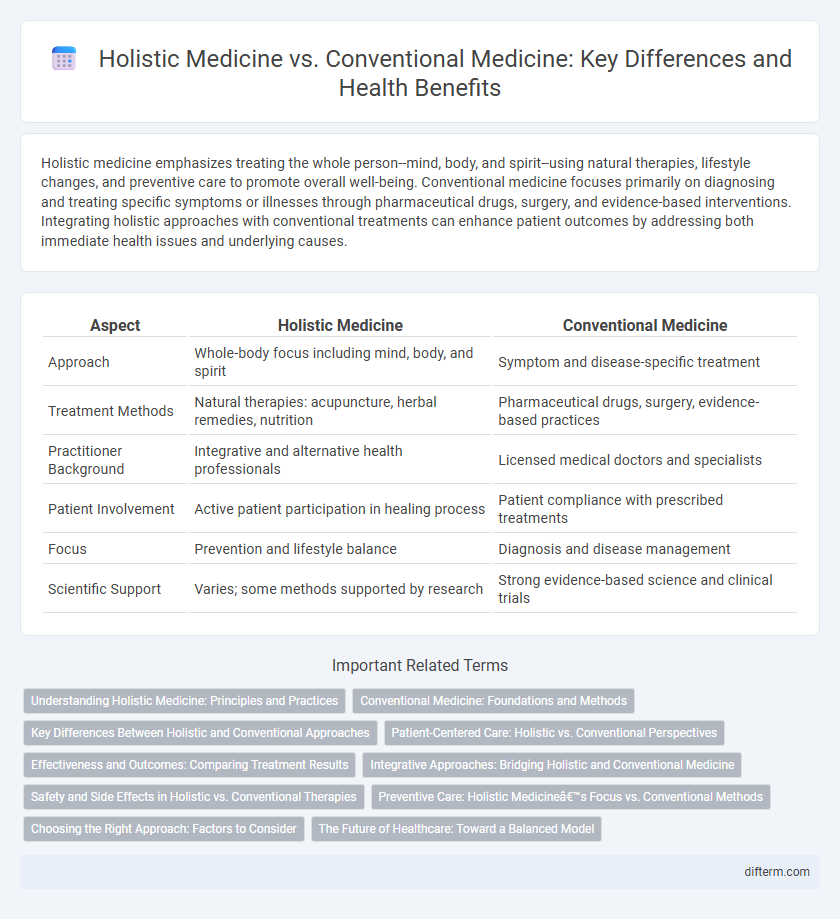Holistic medicine emphasizes treating the whole person--mind, body, and spirit--using natural therapies, lifestyle changes, and preventive care to promote overall well-being. Conventional medicine focuses primarily on diagnosing and treating specific symptoms or illnesses through pharmaceutical drugs, surgery, and evidence-based interventions. Integrating holistic approaches with conventional treatments can enhance patient outcomes by addressing both immediate health issues and underlying causes.
Table of Comparison
| Aspect | Holistic Medicine | Conventional Medicine |
|---|---|---|
| Approach | Whole-body focus including mind, body, and spirit | Symptom and disease-specific treatment |
| Treatment Methods | Natural therapies: acupuncture, herbal remedies, nutrition | Pharmaceutical drugs, surgery, evidence-based practices |
| Practitioner Background | Integrative and alternative health professionals | Licensed medical doctors and specialists |
| Patient Involvement | Active patient participation in healing process | Patient compliance with prescribed treatments |
| Focus | Prevention and lifestyle balance | Diagnosis and disease management |
| Scientific Support | Varies; some methods supported by research | Strong evidence-based science and clinical trials |
Understanding Holistic Medicine: Principles and Practices
Holistic medicine emphasizes treating the whole person--mind, body, and spirit--rather than focusing solely on symptoms or disease. Core principles include individualized care, prevention, and integration of diverse therapies such as acupuncture, nutrition, and mindfulness to promote overall well-being. This approach fosters patient empowerment through active participation in healing and addresses root causes rather than just managing conditions.
Conventional Medicine: Foundations and Methods
Conventional medicine is grounded in evidence-based practices, emphasizing diagnosis and treatment through scientific methods such as pharmacology, surgery, and radiation therapy. It relies heavily on standardized clinical protocols and diagnostic tools like blood tests, imaging, and biopsies to manage acute and chronic conditions effectively. The foundation of conventional medicine lies in rigorous research, clinical trials, and regulatory approvals ensuring safety and efficacy for diverse patient populations.
Key Differences Between Holistic and Conventional Approaches
Holistic medicine emphasizes treating the whole person by integrating physical, mental, and emotional health, often utilizing natural therapies and personalized care plans. Conventional medicine focuses on diagnosing and treating specific symptoms or diseases primarily through pharmaceutical drugs, surgery, and standardized protocols. Key differences include holistic medicine's preventative and patient-centered approach versus conventional medicine's disease-centered and evidence-based methodologies.
Patient-Centered Care: Holistic vs. Conventional Perspectives
Holistic medicine emphasizes patient-centered care by addressing physical, emotional, and spiritual health, fostering personalized treatment plans. Conventional medicine prioritizes evidence-based protocols targeting specific symptoms or diseases, often relying on standardized diagnostic tests and pharmaceutical interventions. Integrating both approaches can enhance patient outcomes by combining comprehensive wellness perspectives with targeted medical expertise.
Effectiveness and Outcomes: Comparing Treatment Results
Holistic medicine emphasizes treating the whole person by integrating physical, emotional, and spiritual health, often resulting in improved patient satisfaction and long-term wellness through personalized care plans. Conventional medicine focuses on diagnosing and treating specific symptoms or diseases using evidence-based protocols, which can provide rapid relief and effective management of acute conditions. Studies reveal that combining holistic approaches with conventional treatments may enhance overall effectiveness and outcomes by addressing root causes and promoting sustainable health improvements.
Integrative Approaches: Bridging Holistic and Conventional Medicine
Integrative approaches in healthcare combine holistic medicine's focus on mind-body-spirit wellness with conventional medicine's emphasis on evidence-based treatments, fostering comprehensive patient care. Techniques such as acupuncture, herbal therapy, and mindfulness are increasingly incorporated alongside pharmaceuticals and surgery to enhance healing and reduce side effects. This synergy promotes personalized treatment plans that address physical symptoms and underlying causes, improving overall health outcomes.
Safety and Side Effects in Holistic vs. Conventional Therapies
Holistic medicine emphasizes natural treatments and personalized care, generally exhibiting fewer side effects due to its use of herbal remedies and lifestyle changes. Conventional medicine often involves pharmaceuticals and surgical interventions that, while effective, may carry a higher risk of adverse reactions and complications. Safety protocols in conventional therapies are strictly regulated, but holistic approaches prioritize minimal invasiveness and prevention to reduce potential harm.
Preventive Care: Holistic Medicine’s Focus vs. Conventional Methods
Holistic medicine prioritizes preventive care by addressing physical, mental, and emotional well-being through natural therapies, nutrition, and lifestyle changes to reduce disease risk. Conventional medicine emphasizes early detection and intervention using diagnostic tests, vaccines, and pharmaceutical treatments to prevent illness progression. Integrating both approaches can enhance overall health outcomes by combining personalized lifestyle adjustments with evidence-based clinical practices.
Choosing the Right Approach: Factors to Consider
Holistic medicine emphasizes treating the whole person, addressing physical, emotional, and spiritual health, while conventional medicine focuses on diagnosing and treating specific symptoms or diseases using evidence-based methods. Factors to consider when choosing the right approach include the nature and severity of the condition, patient preferences, and the availability of integrative options that combine both holistic and conventional therapies. Evaluating treatment goals, potential risks, and the need for immediate vs. long-term care helps determine the most effective and personalized healthcare strategy.
The Future of Healthcare: Toward a Balanced Model
The future of healthcare lies in integrating holistic medicine's emphasis on whole-person care with conventional medicine's evidence-based treatments to create a balanced model. Personalized medicine, advanced diagnostics, and patient-centered approaches are driving this shift toward comprehensive health management. Emerging technologies like AI and telehealth enable seamless coordination between holistic and conventional practices, improving outcomes and enhancing patient satisfaction.
Holistic medicine vs Conventional medicine Infographic

 difterm.com
difterm.com